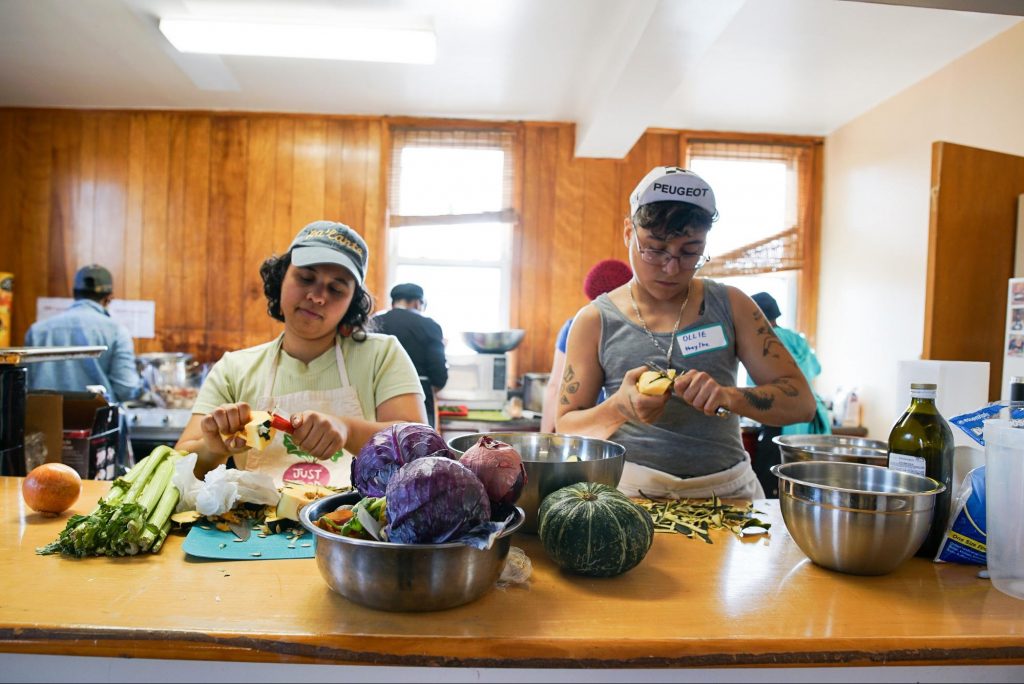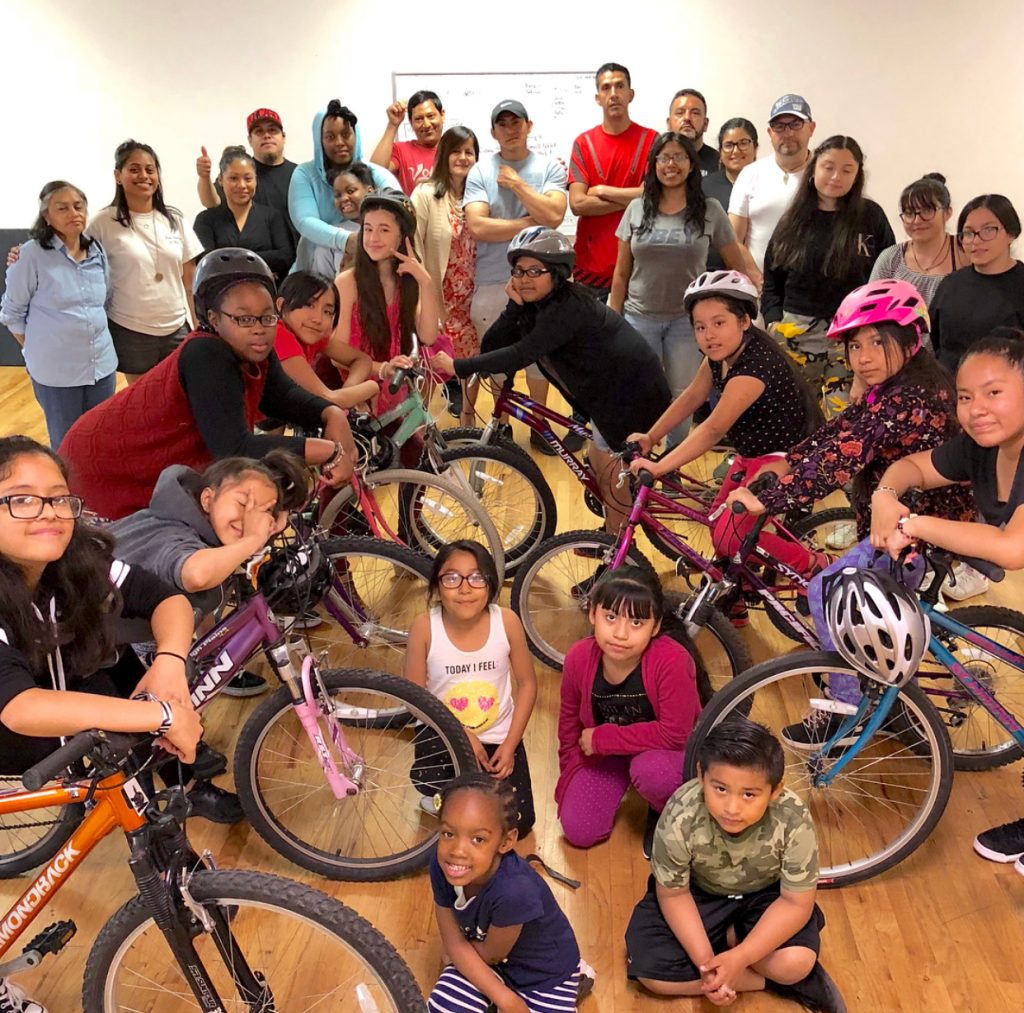ayday Space is a collectively-run organizing center and social hub based in the Bushwick neighborhood of Brooklyn. They host fundraising parties for grassroots organizations, film screenings, workshops, open mics, art exhibitions, and more. Since its founding in 2013, Mayday Space has become a crucial resource for anyone concerned with social justice. With a wonderful, diverse leadership team and a well-planned structure, they’re an inspiration for what a modern social center can look like.
I spoke to collective members Lucas and Pati about the history of the space, its overall mission, its operations during the COVID-19 pandemic, and more.
 Mayday Space has grown into an amazing resource in Brooklyn. How did it begin? You have a very thorough handbook on your website that details everything about your history and structure. But what was the real impetus to start a social center and event space?
Mayday Space has grown into an amazing resource in Brooklyn. How did it begin? You have a very thorough handbook on your website that details everything about your history and structure. But what was the real impetus to start a social center and event space?
Many of us had long been clamoring for a space that could connect activists and community-minded folks outside of issue silos, professionalized nonprofits and ephemeral street protests. We launched Mayday to serve as a citywide destination, but also as a neighborhood resource in meaningful ways. Many grassroots groups struggle to find reliable, mission-aligned, affordable spaces where they can hold their trainings, parties, meetings, and all-ages gatherings, so we wanted Mayday to help provide that while also running some of our own public events and organizing initiatives. We’ve come a long way in six years, but we still have a long way to go.
Talk about your relationship with Starr Bar, your sister business.
Starr Bar is our sister space a short 10-minute walk from Mayday. The original vision for our project was a ground floor bar and events space and an upstairs popular education and organizing hub with a beautiful interplay between the two. Skyrocketing rent and the serendipity of finding our current multi-story location led to us being more separate projects, but we still uplift each other’s work, have a shared weekly events newsletter (pre-COVID), and a portion of Starr Bar profits help keep Mayday alive. Since opening its doors, Starr Bar has been one of the only nightlife venues in NYC committed to grassroots organizing and a ton of organizations host their fundraiser parties and performances there. They are in the process of reopening with to-go and delivery as well as broadcasted music and community focused events. As quarantine eases up, we hope to reimagine ways we can better serve our communities together.
“We launched Mayday to serve as a citywide destination, but also as a neighborhood resource in meaningful ways.”
Although social centers are very common in particular countries with a strong radical left, such as Greece, you don’t find too many of them here. How would you describe the mission of Mayday Space to someone just learning about it?
This is actually a tougher question than you might think! Since there aren’t many cooperatively managed movement spaces around NYC, few people intuitively know what we’re really about without having visited Mayday. We’re run mostly by our volunteer Collective, along with our teeny-tiny staff and a slew of co-conspirators who breathe life into our space. Social centers are typically hybrids—part community events venue, part hangout spot for radicals of various sorts, part alternative institution that models liberatory ways of being outside of capitalist norms. We aim to be a place where people play around with big ideas together, and find practical ways to push for social transformation from the local to the global.
 You’ve shared a space with Bushwick Abbey since the beginning. Do you think you’d ever move into a new space? And if so, what would a future Mayday Space look like?
You’ve shared a space with Bushwick Abbey since the beginning. Do you think you’d ever move into a new space? And if so, what would a future Mayday Space look like?
We’ve had a fruitful relationship with the two small congregations that share the building that houses Mayday. That said, we’ve always dreamed of having a space of our own, one that is wheelchair accessible, permanently affordable, and where we can more fully create the colorful, welcoming vibe we’ve been aiming for. A downside to our current space is that there isn’t a place any visitor can pop in at any given hour to see what’s up and mill around. Our future space will ideally have a cafe or bookshop included so it’s easier to build a consistent sense of community.
Right now we are dealing with this COVID-19 pandemic. Most people have stayed home to the extent that they can, and businesses have been closed. How have you all plugged into the relief efforts? How did you have to adapt to this new reality?
We closed our doors to public programming back in March and have shifted our work and collective capacity to respond to the crisis. For the past two months we’ve run a weekly food distribution hub out of the space, bagging groceries for hundreds of families every Wednesday. There’s been a desire to stay engaged despite quarantine, so we’ve conducted online book talks, a film screening, an open mic, a Mayday stakeholder gathering, and a virtual rally with frontline worker leaders for our namesake holiday on May 1st. We’ve strengthened a few existing partnerships and forged some new ones, while recognizing we’re but a small vehicle for the radical changes our city and world so desperately need now more than ever.
“We closed our doors to public programming back in March and have shifted our work and collective capacity to respond to the [COVID-19] crisis. For the past two months we’ve run a weekly food distribution hub out of the space, bagging groceries for hundreds of families every Wednesday.”
 How did you connect with the people that were in need of groceries, and how did you go about accommodating them?
How did you connect with the people that were in need of groceries, and how did you go about accommodating them?
We’ve been working in tandem with City Harvest and Universe City to bag recovered food, mostly for public housing residents in Bushwick and Brownsville. That’s being coordinated in partnership with the Tenant Associations in each development. Beyond that, we’ve relied on our partners in Bushwick Mutual Aid that are fielding requests from local neighbors in need, primarily around securing food donations in collaboration with other neighborhood allies like the rad bilingual bookstore Mil Mundos. Mayday assembles a crew of volunteers each week to bag the groceries, adding in know-your-rights and other printed organizing and resource materials in English and Spanish. We’re figuring out how our space could regularly and safely prepare and serve cooked meals, but that’s more of a medium-term effort.
Where are some areas of mutual aid that are currently lacking and in need of people to plug in?
Many of the mutual aid groups that have sprung up in the last few months are struggling to meet the overwhelming need of families left without income or a reliable social safety net. Our city was already mired with extreme racial and class inequality before COVID-19 and volunteer efforts that try to embody solidarity can sometimes fall into the paternalistic charity model that perpetuates the schism of haves/have nots. Since mid-April, Mayday has been facilitating citywide calls in partnership with Mutual Aid NYC to provide a consistent space to tackle some of the dilemmas. Each week we focus on a main topic like fundraising, food scarcity, multilingual organizing, effective community partnerships, and rent strikes, creating an open forum for mutual aid groups to share best-practices and problem solve together. In Bushwick, we likewise host a weekly call for all neighborhood stakeholders to provide updates and promote collaboration. This is all very imperfect work and we’re trying to learn and improve as we move through it.
 What does the future look like for Mayday Space and how can people support you?
What does the future look like for Mayday Space and how can people support you?
First off, we’d love everyone who believes in our mission and providing infrastructure to grassroots movements to join us as Mayday members (one-time donations welcome there, too!). You get perks in return and are welcomed into our extended network. We want to play our part in building power for bottom-up, long-term recovery for our city that redistributes wealth and power so everyone can thrive. The health, social and economic impacts of this pandemic will continue to devastate our world and especially those on the margins until we address the crisis of capitalism, structural racism, the climate emergency and other forms of domination and social exclusion.
We want Mayday to help inspire, connect, and train a very wide range of leaders reaching beyond the activist choir and the nonprofit industrial complex. Eventually Mayday will fully re-open our doors to deepen that movement-building work, while also being a place for creativity and joy even in dark times. Much of the rest remains to be written, and hopefully some of you reading this can play a part in our next chapter.
For more information on Mayday Space and the amazing work they’re doing, visit their website. You can also follow them on Instagram and Facebook.
Community Spotlight is a blog series that seeks to connect people and build power. Each post will feature a person or organization doing great work in their community and fighting for a more just world. We interview writers, illustrators, podcasters, filmmakers, activists, and more. Subscribe today and let’s start building together.





